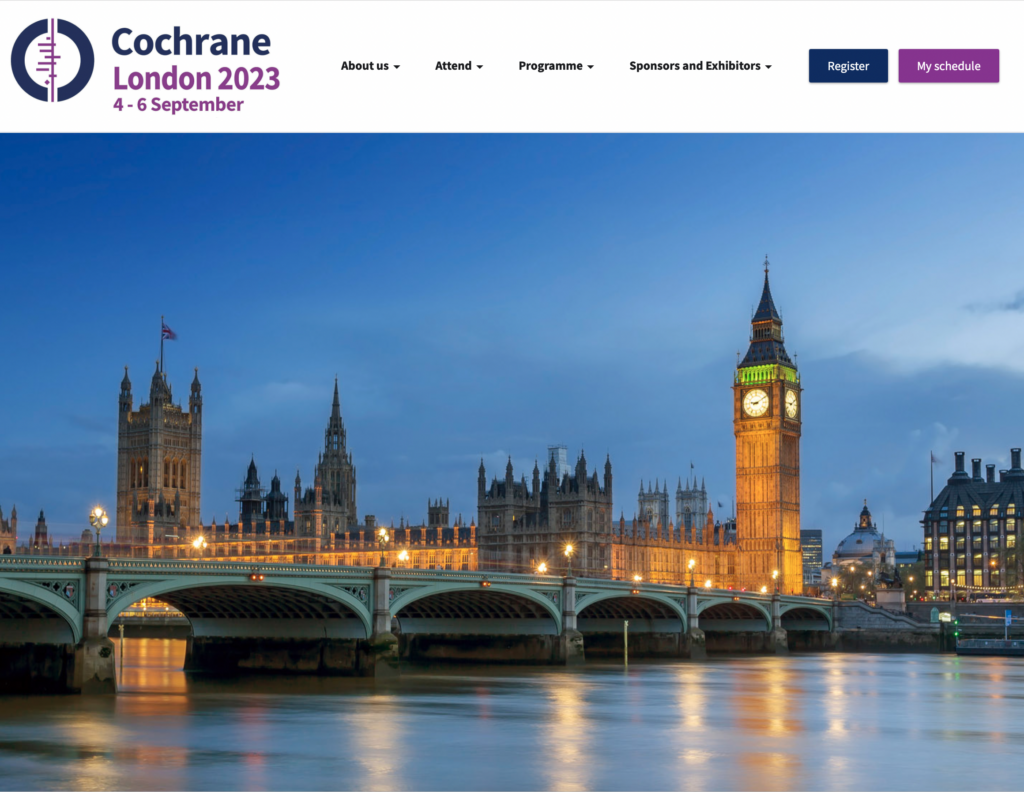
Youssef Zeidan is a radiation oncologist at the Lynn Cancer Center, part of Baptist Health South Florida. Dr. Zeidan was previously an assistant professor of radiation oncology at the American University of Beirut, where he mentored several students who are now working at cancer centers and universities throughout the United States. Dr. Zeidan and his team have authored more than 50 publications related to radiation oncology. He was also part of the committee that developed the 2025 American Society for Radiation Oncology, American Society of Clinical Oncology, and Society of Surgical Oncology guideline on postmastectomy radiation therapy. His contributions to that committee drew upon research conducted with the Vivli platform.
In the extended interview below, Dr. Zeidan discusses how his work with Vivli has influenced both his medical practice and mentorship. Responses have been edited for length and clarity.
Watch the video: Dr. Zeidan discusses how his research with Vivli informs his clinical practice
How did you first learn about Vivli?
I learned about Vivli first from a colleague at a medical conference that I was attending, and it’s been a great journey since then. I’m very thankful for the circumstances. We were at a conference for breast cancer, and they shared with me that I could access clinical trial data through Vivli.
What made you interested in using the platform?
Once I started looking at Vivli, I found it very helpful in asking clinically relevant questions, especially in my domain, which is radiation therapy for breast cancer. Over the past seven years, Vivli has been a great partner in answering key questions in radiation therapy that are relevant to breast cancer patients. We run into situations in treating breast cancer where there are a lot of grey zones, and we don’t have available clinical trial data. Vivli has been a great platform for doing secondary analysis and trying to answer those questions.
Why is Vivli so important for your area of research?
Radiation therapy uses high energy x-rays to treat cancer patients, in my case breast cancer. Vivli has this unique ability to capture data about radiation therapy even though the trials did not specifically ask about the impact of radiation therapy in breast cancer.
For us, it’s a tremendous resource to repurpose and re-analyze those trials for secondary objectives to see the impact of radiation therapy, rather than the drug that the trial is trying to evaluate. In order to do that, we have to do it in a very balanced manner, in a very efficient manner. It takes a tremendous effort from the statisticians, the physicians, the people collecting data, and our partners at Vivli to bring it to an outcome.
How have you used Vivli as a tool for mentorship?
Many of my research team members started as medical students working with me as their advisor. Some of them have now taken faculty positions in very important cancer centers. It’s very rewarding to see the impact of that work, not only in terms of scientific value, but also in terms of the humanitarian value and what happens to the careers of the individuals who are conducting the research.
As a faculty member, I always had students that knocked on my door; they love to be involved in research, love to have projects. The interest is genuine—so to have these students with that drive to answer clinical questions that are out there is huge for us. Having a platform that is willing to partner with us as researchers and help us mentor the younger generation of researchers made the experience even better.
The supervision part was important, but once they get the hang of the Vivli platform and they know how to access the dataset, it really goes by much more effectively and efficiently. It’s a process from accessing the raw data to extracting it, analyzing it, making charts, and then sharing it, whether in terms of presentations or manuscripts. All of these steps from accessing data to analyzing to sharing, whether in terms of a conference or a paper, are different stations and different opportunities for mentoring people who are entering into the medical workforce. For me, looking forward at what those students—and now physicians—are doing and how they’re going to carry that into their own careers and mentor the next generation, it’s really an exponential impact.
You practice medicine, as well as researching. Can you tell us a bit about how continuing to practice medicine affects your perspective as a researcher?
My practice is primarily breast cancer. A lot of the cases that we see are challenging and don’t have a straightforward answer, and we have to scratch our heads to find the optimal treatments according to the best evidence. In doing that process and seeing patients in the clinic, we come up with new questions that we don’t have an answer to every day.
Vivli is an excellent partner and a resource for us to inquire about those questions and find answers through rigorous clinical research and secondary analyses. It really takes a village to come up with answers and clinically meaningful outcomes. I find this exercise of coming up with questions in the clinic, taking them back to the research drawing board, and bringing those answers back to the clinic to be a very fruitful one.
Your research was recently cited in the updated guideline for breast cancer radiation therapy. Could you talk a bit about that?
Recently, the American Society for Radiation Oncology (ASTRO) decided to update their guideline for radiation therapy for breast cancer. The prior guideline was 11 years old. You can imagine how much new data became available, whether from our group or others, during this 11-year period. Fortunately, they recognized this as an area of need.
The part that was assigned to me to lead as part of the committee was actually the part that I had researched using the data provided by Vivli, so it was full circle for me. What we’ve done is to capture data that came up, including secondary analyses from clinical trials—using data like that available from Vivli—and cite that data as evidence for guiding practitioners on how to treat specific types of breast cancer cases with radiation therapy.
Thinking about your patients, is that what you hope the outcome will be? Something like that guideline?
There is not a single case that we see in the clinic that is identical to the prior case. Each case is unique in several aspects. In situations where the quality of the evidence is not very high or there are grey zones where we lack evidence, I share that with my patients. Being focused and specialized in a certain domain really gives you that edge to bring to your patients the latest and greatest research, rather than having them use open, non-resource-verified sources online. Making that step easier on the patients at a time when they have so many things on their plate is very important.
What Vivli is doing on a bigger scale is really impacting healthcare in so many ways, specifically cancer care. I’m grateful for having the opportunity to use Vivli for research, and I think the process made me a better physician for my patients.




 Rheumatoid arthritis (RA) is an autoimmune disorder, which primarily affects the joints and is characterized by inflammation and pain. RA most commonly affects the hands and wrists, but can also affect other parts of the body. There is currently no cure for RA, but treatment options have improved considerably in recent years with the development of new therapies and treatment strategies.
Rheumatoid arthritis (RA) is an autoimmune disorder, which primarily affects the joints and is characterized by inflammation and pain. RA most commonly affects the hands and wrists, but can also affect other parts of the body. There is currently no cure for RA, but treatment options have improved considerably in recent years with the development of new therapies and treatment strategies. Rheumatoid arthritis (RA) poses a significant challenge due to its chronic nature and impact on joint health. While treatments have evolved, achieving remission remains elusive for many patients. Using a dataset from the Vivli repository, Dr. Ricardo Ferreira and a team of researchers delved into examining the assessment criteria for remission in RA, shedding light on the limitations of current approaches and proposing a new model—the dual target strategy.
Rheumatoid arthritis (RA) poses a significant challenge due to its chronic nature and impact on joint health. While treatments have evolved, achieving remission remains elusive for many patients. Using a dataset from the Vivli repository, Dr. Ricardo Ferreira and a team of researchers delved into examining the assessment criteria for remission in RA, shedding light on the limitations of current approaches and proposing a new model—the dual target strategy. In a recent study led by Dr. Sarah Nevitt, a senior research associate at the University of Liverpool, a team of researchers examined the effectiveness of various antiepileptic drugs (AEDs) used as monotherapy for people experiencing seizures due to epilepsy. Epilepsy, a common neurological disorder, results from abnormal electrical discharges in the brain, causing recurrent seizures. Typically, around 60% to 70% of individuals with epilepsy achieve longer-term remission, often shortly after beginning treatment with antiepileptic drugs.
In a recent study led by Dr. Sarah Nevitt, a senior research associate at the University of Liverpool, a team of researchers examined the effectiveness of various antiepileptic drugs (AEDs) used as monotherapy for people experiencing seizures due to epilepsy. Epilepsy, a common neurological disorder, results from abnormal electrical discharges in the brain, causing recurrent seizures. Typically, around 60% to 70% of individuals with epilepsy achieve longer-term remission, often shortly after beginning treatment with antiepileptic drugs. The
The  Did you know there’s more on Vivli than just clinical trial data? The majority of our repository of data comes from clinical trial data, but also includes significant numbers of platform trials, observational studies, and real-world evidence resources.
Did you know there’s more on Vivli than just clinical trial data? The majority of our repository of data comes from clinical trial data, but also includes significant numbers of platform trials, observational studies, and real-world evidence resources.